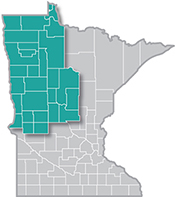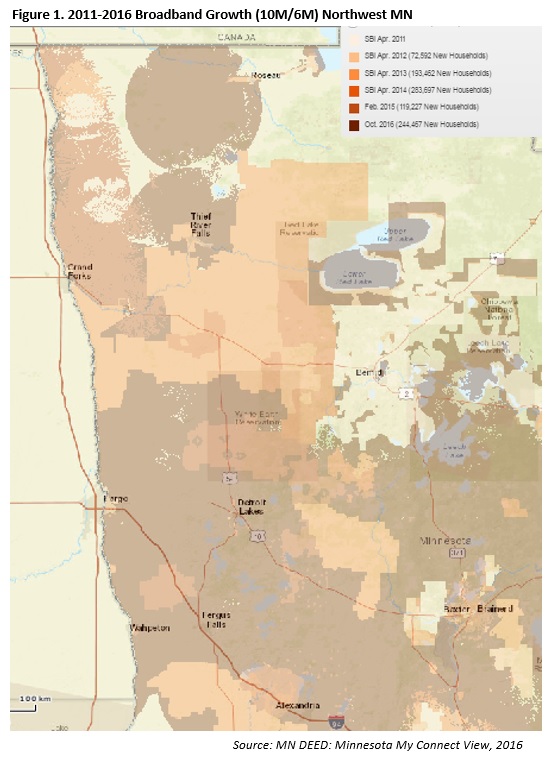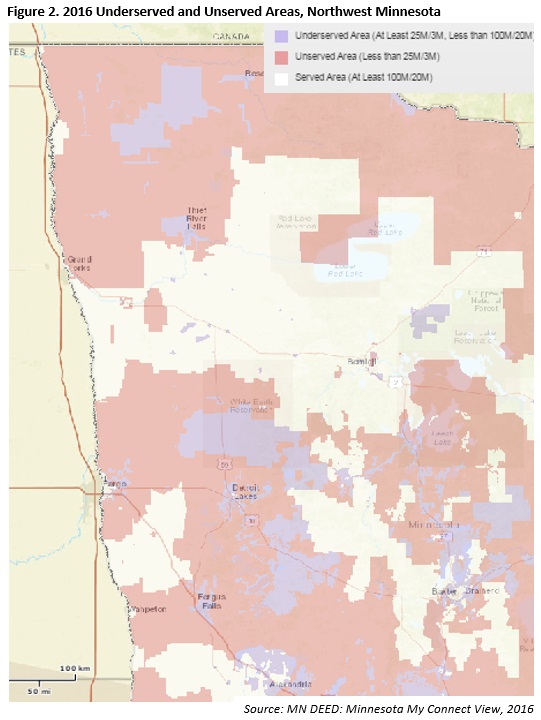 The presence of such industry powerhouses as Polaris, Arctic Cat and New Flyer make Northwest Minnesota a hub of transportation equipment manufacturing.
The presence of such industry powerhouses as Polaris, Arctic Cat and New Flyer make Northwest Minnesota a hub of transportation equipment manufacturing.
From wheat and potatoes to soybeans and sugar beets, the region is a major producer and processor of food staples and specialty agricultural products.
Want the freshest data delivered by email? Subscribe to our regional newsletters.
1/19/2017 12:04:56 PM
Chet Bodin
What does broadband mean for economic development? A report from the Internet Innovation Alliance shows that the broadband sector (information and communication technologies) was responsible for 4.9 million jobs in 2014, or 4.2 percent of all U.S. private employment. As such, broadband capacity may be an important determining factor in the share of future technology jobs that are created outside of metro areas.
For several years, broadband expansion has been a priority in Minnesota as rural employers and entrepreneurs strive to keep pace with advancements in technology that can help make them more competitive. The Governor’s Task Force on Broadband released its 2016 annual report, which outlined how $35 million was allocated by the legislature for DEED’s Border-to-Border Broadband Development Grant Program.
Established in 2013, the Border-to-Border Broadband Development Grant Program aims to increase investments in infrastructure in unserved and underserved areas. In turn, these investments will help put rural areas in a position to attract and retain more businesses, and ideally employ more workers. These improvements are welcome in Northwest Minnesota, which consists of 26 mostly rural counties. Despite some economic centers scattered throughout, Northwest Minnesota remains the only planning area in the state without a Metropolitan Statistical Area (MSA) primarily located in it.
Projected computer and information technology (IT) job growth in Northwest Minnesota is relatively low compared to other parts of the state. Computer and IT-related jobs are very likely to grow with the pace of broadband, although broadband expansion could lead to a need for occupations that don’t even exist yet. Here are jobs that didn’t exist 10 years ago.
As broadband access and the capabilities of business to harness it grows, a greater need for computer specialists and network architects may also emerge in Northwest Minnesota. But in what may be a reflection of slower broadband development in some parts of Northwest Minnesota, employment projections in computer occupations are much lower in the region than in the state as a whole. (Table 1).

Broadband has expanded significantly in Northwest Minnesota since 2011, at least for lower download speeds. The expansion at the 10M download speed has allowed for more access on personal computers and residential accounts. Job seekers and other rural residents are much more plugged in than they used to be – an important capability for those outside metro areas who need reliable access to a world that’s dramatically more connected and interdependent than it used to be (Figure 1).

The caveat is that economic development also benefits from faster broadband speeds that allow businesses the ability to function faster than an average residential user. Many areas of Northwest Minnesota remain underserved in this capacity.
Broadband at 100M download speed is much less available in remote areas, but is also lacking in some economic centers such as Fergus Falls, Thief River Falls, and Walker – not to mention countless small towns that would also benefit from broadband expansion (Figure 2).

Some areas are increasing speed incrementally, moving above 25M download speed. Given that some estimates put the total cost of statewide broadband access at around $3 billion, the pace is understandable. But the lack of consistent access in all areas has put less connected areas at a technological disadvantage.
For 2017, the Governor’s Task Force has recommended $100 million for the Border-to-Border Broadband Development Grant Program. If even half that much is allocated to the program, funding in 2017 would far exceed that which has been dedicated to develop broadband capacity throughout the state thus far. Ideally, this would help employers and entrepreneurs in Northwest Minnesota keep pace with other parts of the state, and lead to more regional IT jobs in the future.
Contact Chet Bodin.